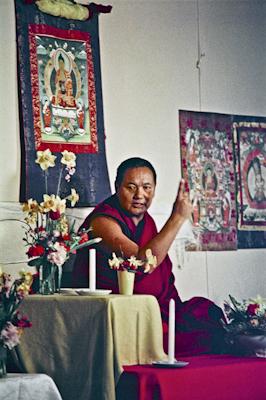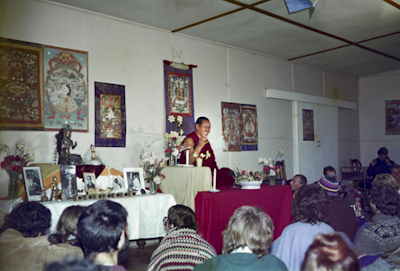Dear Friends,
Thank you so much for your interest in our monthly LYWA eletter. Please share it with anybody who might be interested. As usual, we have some beautiful Dharma teachings for you!
First I'd like to thank from the bottom of my heart those who so kindly contributed to our Chokhor Duchen appeal, including our wonderful LYWA Facebook friends. We raised about $7,000 for our publishing fund, which will help greatly in our ongoing work. Thank you again. It is only through your generosity that we are able to share the amazing teachings of Lama Yeshe and Lama Zopa Rinpoche in so many ways.
Please read on for the aforementioned beautiful Dharma teachings.
From the Video Archive: Lama in the Dharma
This archival film was made under the auspices of the Australian Experimental Film and TV Fund. Lama Yeshe gave these teachings to Dharma students in Olinda, Victoria, Australia in 1976. Lama wonderfully presents how karma works in our lives and how we can control our karma through controlling our minds. You will find the edited transcript of these teachings in this month's eletter below. You may also want to check out Volume 1, Chapter 15, “Melbourne: The Olinda Course” in Big Love: The Life and Teachings of Lama Yeshe, to learn more about the events surrounding these historic teachings.
Visit and subscribe to the LYWA YouTube channel to view dozens more videos freely available from our archive. See also the FPMT YouTube channel for many more videos of Lama Zopa Rinpoche’s teachings.
On the LYWA Podcast: The Benefits of Thought Transformation
All the hindrances of life, all the hindrances of meditation, of practicing Dharma, by practicing Mahayana thought training, all those hindrances of meditation, of Dharma practice, all those become helpers, beneficial conditions to practice Dharma.—Lama Zopa Rinpoche
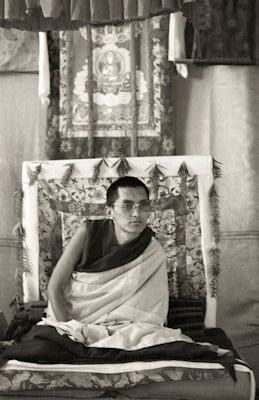 This month's podcast is an excerpt from teachings on Geshe Langri Tangpa's Eight Verses of Thought Transformation, given by Lama Zopa Rinpoche at Manjushri Institute, Cumbria, England, August 16-24, 1979. These teachings were given by Rinpoche while he and Lama Yeshe were on a teaching tour in Europe. You can read along with the transcript on our website and find out more about the lamas’ 1979 teaching tour in Big Love: The Life and Teachings of Lama Yeshe, Volume 2, Chapter 17: “Even Your Enemy Who Tries to Kill You is Your Best Friend.”
This month's podcast is an excerpt from teachings on Geshe Langri Tangpa's Eight Verses of Thought Transformation, given by Lama Zopa Rinpoche at Manjushri Institute, Cumbria, England, August 16-24, 1979. These teachings were given by Rinpoche while he and Lama Yeshe were on a teaching tour in Europe. You can read along with the transcript on our website and find out more about the lamas’ 1979 teaching tour in Big Love: The Life and Teachings of Lama Yeshe, Volume 2, Chapter 17: “Even Your Enemy Who Tries to Kill You is Your Best Friend.”
The LYWA podcast contains hundreds of hours of audio, each with links to the accompanying lightly edited transcripts. See the LYWA podcast page to search or browse the entire collection by topic or date, and for easy instructions on how to subscribe.
WHAT'S NEW ON OUR WEBSITE
 We have a new French translation to share with you, Advice for Monks and Nuns, a collection of talks given by Lama Yeshe and Lama Zopa Rinpoche to their ordained students. This collection has recently been translated into French by Éditions Mahayana, and is available for order in print or as an ebook. We have also updated the French Translations page with links to LYWA publications by Éditions Mahayana. You can find a complete list of translations of Lama Yeshe's and Lama Zopa Rinpoche's teachings here on the Éditions Mahayana website.
We have a new French translation to share with you, Advice for Monks and Nuns, a collection of talks given by Lama Yeshe and Lama Zopa Rinpoche to their ordained students. This collection has recently been translated into French by Éditions Mahayana, and is available for order in print or as an ebook. We have also updated the French Translations page with links to LYWA publications by Éditions Mahayana. You can find a complete list of translations of Lama Yeshe's and Lama Zopa Rinpoche's teachings here on the Éditions Mahayana website.
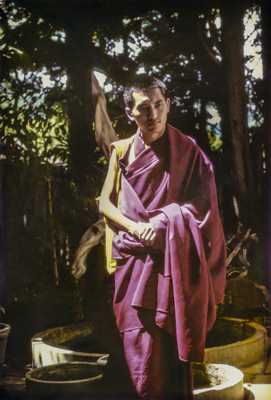 This month we also have new additions to Lama Zopa Rinpoche's Online Advice Book to share with you:
This month we also have new additions to Lama Zopa Rinpoche's Online Advice Book to share with you:
- Every Sentient Being Is Most Kind, Most Dear, Most Precious: Rinpoche sent this letter to a student who wanted to leave the Dharma center. Rinpoche asked the student to support the center and the teacher, to join in activities at the center and to avoid disharmony.
- Resuming Study After Directorship:This advice was given to a student who had experienced many obstacles as center director. After resigning from that role, the student’s problems had ceased, they were happier and able to resume study.
- We All Have to Die Sooner or Later: A student wrote that her husband was very close to dying and she was taking care of him. It was an extremely difficult time for her, and she was upset that he was dying.
- Sutra Recitation to Remove Obstacles and Bring Happiness to All Beings: Rinpoche gave this advice to a student who asked what could be done to remove obstacles for their family.
Rinpoche at Kopan
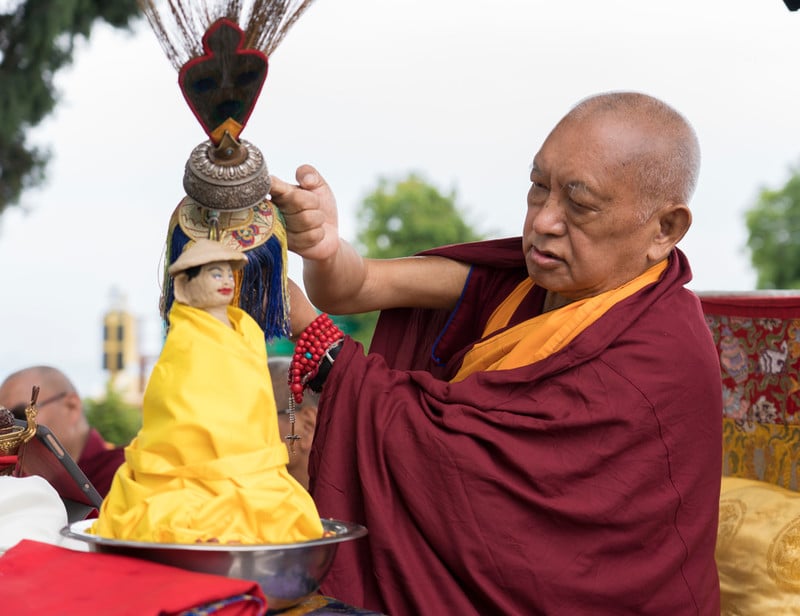 During the coronavirus pandemic, Lama Zopa Rinpoche has been staying at Kopan Monastery in Nepal. Now you can see more than seventy photos of day to day life at Kopan under lockdown in a new photo album shared by FPMT of pictures spanning from March to June 2020. In addition to photos of Rinpoche, FPMT also collected photos of Kopan monks and staff as they do some of their daily activities.
During the coronavirus pandemic, Lama Zopa Rinpoche has been staying at Kopan Monastery in Nepal. Now you can see more than seventy photos of day to day life at Kopan under lockdown in a new photo album shared by FPMT of pictures spanning from March to June 2020. In addition to photos of Rinpoche, FPMT also collected photos of Kopan monks and staff as they do some of their daily activities.
Spreading Big Love
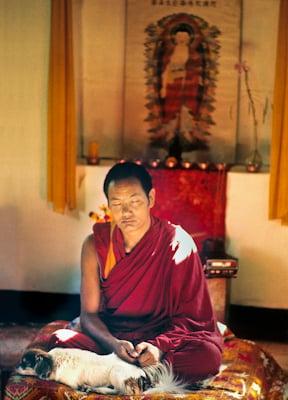 Thank you to all who stepped forward to sponsor an International Mahayana Institute (IMI) monk or nun to receive a free copy of Big Love ;for our appeal on International Sangha Day. Your support is appreciated!
Thank you to all who stepped forward to sponsor an International Mahayana Institute (IMI) monk or nun to receive a free copy of Big Love ;for our appeal on International Sangha Day. Your support is appreciated!
Check out our new webpage, Reflections, where we are posting anecdotes, poems and letters sent in by students as they reminisce and share their experiences of Lama Yeshe. This page complements What People Are Saying About Big Love, which is a growing collection of feedback and praise for Big Love. Please don't forget to update us on what you think about Big Love by writing to us at [email protected].
And speaking of feedback may we ask you a favor? Would you be willing to add an enthusiastic review of Big Love to the Big Love Amazon page? As part of your review you can use your phone to upload an image of or make a short video presentation about your copy of Big Love. This will make your review even more alluring. By adding your review, you help create the causes for Amazon to suggest Big Love to more and more people. Please help us spread the Big Love word and cast the net even wider. Thank you!
Big Love to LYWA Staff
Thank you again for reading. I was recently honored to be asked to talk about the early days of the FPMT as the introduction to one of Rinpoche's teachings from Kopan during the pandemic. Check it out!
And before I go I'd like to also thank most sincerely my dedicated colleagues who actually do most of the work putting these eletters together: Jen Barlow, Stacey Martin, Megan Evart and Sandy Smith. It wouldn't happen without them.
Finally, please enjoy this month's teaching by Lama Yeshe, which is appearing for the first time ever in print. See Big Love, page 524, for the context.
Big love,

Nick Ribush
Director
This Month's Teaching: The human problem is not understanding the reality of what we are
Karma
In English, one word can have different meanings. Similarly, whenever you express your own religious conceptions, ideas, philosophies or doctrines—whatever word you choose for it—saying, “This is right, that is wrong,” you’re just expressing your personal experience, making a personal judgment, not something that’s true in terms of the understanding of all of humanity. Still, I think it’s difficult for you to understand even your own personal experience of the way you perceive things, the way you feel, the way you discriminate.
However, through meditation, you can learn to tell the difference between right and wrong mental attitudes and, in particular, you can see how your dissatisfied mind makes you miserable. By understanding that, you can liberate yourself from confusion—you don’t need to believe in something. That’s why in his teachings Lord Buddha said that understanding knowledge-wisdom is the path to liberation.
Most of the time, including the present, we’re unaware of what we’re experiencing. We eat, drink and so forth unconsciously. It’s true—I’m not trying to hypnotize you. Most of the time we’re unconscious. But, through meditation you can recollect all your past experiences. You can take your mind back through last month, last year and all the way back to the time you were reborn. Then, by knowing the cause and effect of your past lives’ experience, you can relate it to the present time and understand what’s going on now: “If right now I put my actions into this particular channel the effect should be such and such.” You can get a pretty good idea.
Therefore, it’s very important to know what’s going on in both your past and future experiences. “If I act this way, this is going to happen. If I act that way, that will be the effect.” Karma is very important.
Otherwise, many people think, “Whatever comes, comes. I’ll go along with that.” And then you do. Other people, especially in the East, have an extreme view of karma: “Karma is fixed; I can’t do anything. My karma has given me this kind of life; I have to accept it.” You can accept what you are in this present life, but it’s not fixed. You can change your present situation for a better future. It’s not fixed.
If you say, “My karma has led me to this miserable life, I can’t do anything about it, I believe in my karma,” that’s ridiculous. Instead of making progress and becoming more open, by accepting that wrong philosophy of karma you become more narrow-minded. That’s a dangerous thing. You talk about karma, but if you don’t know what karma really is and believe in your limited idea of it, you become a fanatic. Therefore, it’s very important to have the right understanding of karma.
Q. It seems, for instance, that whatever situation you’re born in, that’s your karma, and that’s something you can’t change.
Lama. Yes, that’s right. You can’t change that, but you can change lifestyle. For example, I was born in Tibet but now I’ve changed in that I’ve adapted to the Australian lifestyle. I’m eating muesli, fantastic chocolates and other things that we didn’t have in Tibet!
Look, say you accidentally cut your arm. OK, it’s already cut, but there’s no point worrying. That won’t help. What you should do is take measures to heal that cut. That’s all you can do. The cut is there; you have to accept it.
Similarly, say you see a snake. You think, “Oh, a snake’s life is awful. I wish that snake could become a happy person.” That’s impossible. You can wish that, but for the time being the snake’s karma is to be in such a body. Until that karma finishes neither you nor the snake can do anything about it. Its body can’t radically change into a human one just like that. It’s not possible.
However, don’t think that karma is fixed. You can change your karma; you can change a miserable situation into a happy, blissful one. Even if you’ve done the worst, most negative things in the world, you don’t need to worry. If, with right wisdom, you change your old behavior, you can become a perfectly enlightened being, even in this life. For sure, that’s possible.
Willpower
The best thing you can do in the morning is to exercise your willpower. If, when you get up, you generate a strong, powerful motivation for the day, putting your body, speech and mind into the right channel, the rest of your day will go beautifully. Even if people try to agitate you, you remain in control of your emotions. If you can control yourself for one day, you can control yourself for two. If you can control yourself for two days, you can control yourself for three. If you can control yourself for three days, you can control yourself for a week. If you can be happy for a week, why not two? If you can be happy for two weeks, why not a month? If you can be happy for a month, why not a year? And that’s the way your life can go.
Don’t look for some hallucinated fantasy: “Oh, I want higher meditation.” You’re not dealing with reality. Be simple; don’t be arrogant. Meditation practitioners shouldn’t show off to others, “I’m special; I’m a meditator.” No. Just be an average person, simple on the outside but profound within. Try to develop profound wisdom within as much as you possibly can. That’s the important thing. If you try to act important and put on a big show, you’re going to run into difficulties. Psychologically, you’ll make things difficult for yourself.
Mahayana Buddhism contains incredible methods for transforming mundane situations—eating, speaking, drinking, everything—into the blissful path to liberation. Aren’t we lucky? Mahayana teachings never say that negative actions are always completely fixed as negative. It depends on your mental attitude—how you use your wisdom—when you do them. So use it.
Furthermore, being a meditator does not mean just sitting somewhere doing nothing. Every moment, try to be as aware as possible. When you talk to people, be aware. That doesn’t mean you have to squeeze yourself into awareness. As I said before, just be a simple person who’s profound inside. Actually, it’s so simple. Incredible.
In Tibet, we didn’t have many clocks or watches. But all we’d have to do before going to bed was to make the determination, “Tomorrow morning I’m going to wake before sunrise.” And, amazingly, we would! If you’ve had that experience, that’s fantastic. It’s your experience. It’s not something you just have to believe in. That is willpower.
Similarly, if, in the morning, you look at the day ahead and see that you’re going to have to deal with a difficult, complicated situation, do a strong bodhicitta meditation, affirming to yourself, “Today, I’m not going to get angry.” It doesn’t have to be too long; five minutes could be enough. I can guarantee you that on that day you will not get angry. That’s so worthwhile, isn’t it?
Questions and answers
Q. It seems that Buddhism revolves around shunyata. Could you please explain what that is, what absolute nature is?
Lama. Modern science has discovered that all matter—different colors, different objects and so forth—may appear differently, but there is some essential energy, some quality, that embraces all existent matter equally. Buddhism says the same thing. There is an absolute reality, shunyata, that equally embraces all existence. But our relative mind, our mundane thought, cannot see this. It is obscured by superstition.
Therefore, when you meditate or contemplate on your mind, your consciousness, as your concentration deepens this relative perception vanishes. You can release all superstition and relative appearances and experience universal reality. Is that clear? It’s a difficult thing, but the human problem is not understanding the reality of what we are.
Q. Is it possible to discover absolute nature without a guru?
Lama. Sure. It’s possible. When we talk about a guru we’re not saying you need one in this life. Some people are born having already discovered absolute nature. Therefore you can’t say you need a guru to discover it. Even among us here, some people are quite advanced, others have a long way to go. So you cannot say “that-this” exactly. It depends how developed your intelligence is.
Actually, we talk about both relative guru and absolute guru. The relative guru is the person who shows you the path and puts your mind into the right channel. The absolute guru is your own wisdom. Therefore, the absolute guru is more important than the relative.
Q. Lama, do you feel a sense of “I,” and if so, could you explain its nature?
Lama. Do you mean do I feel I have an “I”? [Yes.] Of course I have an “I”—a big “I”! Yes, for sure!
But that’s a good question. I have a big “I,” but you have to be careful. Whether we’re a buddha or a sentient being, we all, equally, have a relative “I.” But we sentient beings paint our relative I over and over again, layer upon layer, coat upon coat. Although deep within, the I is completely nothing, Layer upon layer, we build up a huge, hallucinated world, “This is me.” Then, when somebody says to us, “You are bad,” we get terribly hurt. Actually, nobody can make us bad, nobody can make us good. Our goodness or badness is our own experience. But the intellect is too much, too much. That’s the way it is.
Lama Yeshe gave this teaching in Olinda, Victoria, Australia, 30 July 1976. Archive #776. Edited by Nicholas Ribush. See Big Love: The Life and Teachings of Lama Yeshe, Volume 1, Chapter 15, “Melbourne: The Olinda Course” for the context of this teaching.
























